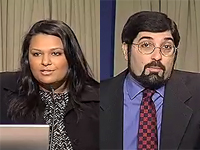Registration
You will receive an email confirming your registration.
In a time of economic turmoil, new American leadership, threats to U.S. security, and debates about the future of U.S. nuclear weapons, it is vital to know how much the United States spends to achieve nuclear security. Using publicly available government documents and conducting extensive interviews with government officials and budget experts, Stephen I. Schwartz and Deepti Choubey assembled a reasonably accurate, although not comprehensive, "budget" of nuclear weapons and weapons-related spending: at least $52 billion dollars.
By creating a new analytic framework that updates Cold War terminology, Schwartz and Choubey were able to allocate nuclear security spending to one of five categories: nuclear forces and operational support; deferred environmental and health costs; missile defense; nuclear threat reduction; and nuclear incident management.
Key Conclusions
- Only 1.3 percent ($700 million) of the nuclear security budget was devoted to preparing for the consequences of a nuclear or radiological attack.
- Another 56 percent of the total went toward operating, sustaining, and upgrading the U.S. nuclear arsenal.
- Nuclear security consumes $13 billion more than international diplomacy and foreign assistance; nearly double what the United States allots for general science, space, and technology; and 14 times what the Department of Energy (DOE) budgets for all energy-related research and development.
- Nuclear weapons and weapons-related programs account for at least 67 percent of DOE's budget, 8.5 percent of the FBI's budget, 7.1 percent of the Department of Defense's budget, and 1.7 percent of the Department of Homeland Security's budget.
Policy Recommendations
Schwartz and Choubey emphasized that implementing the following recommendations will increase understanding and accountability, which in turn will lead to greater public support for critical nuclear security programs and a more effective allocation of public resources. Only a government-directed annual accounting of all nuclear weapons-related spending will ensure that political and financial priorities are properly aligned.
- Require the executive branch to submit both an unclassified and a classified annual accounting of all nuclear weapons-related spending. Without an accurate understanding of the costs of nuclear spending, Congress and the executive branch cannot conduct essential oversight or devise the most effective policy.
- Place greater emphasis on programs that secure and prevent the proliferation of nuclear weapons, weapons material, technology, and expertise.
- Develop better measures to explain and quantify nuclear weapons-related intelligence expenditures. Greater transparency and insight could lead to a more effective allocation of intelligence assets.
- Release an accurate accounting of the number of veterans who have received or been denied compensation and care for radiation exposure during atmospheric nuclear tests between 1946 and 1962, along with the total cost of such compensation and care.
Question and Answer
Participants asked whether the authors could estimate the cost of nuclear-weapons spending in the three categories (intelligence, air defense, anti-submarine warfare) that were not included in the report. Given the classified and dual-use nature of many of the programs involved, it is impossible to reasonably estimate costs. Schwartz and Choubey emphasized that this situation underscores the necessity of a government-mandated accounting of nuclear spending. Similarly, the authors were asked how 2008 spending compared to past trends. Without an annual budgetary review it is impossible to track trends or establish the metrics needed to chart achievements and assess goals.
Participants also questioned whether the analysis gave the authors the ability to evaluate certain programs, specifically missile defense, complex transformation, and the Reliable Replacement Warhead program. The authors stressed that this report does not attempt to answer such questions, but, instead, seeks to lay the appropriate groundwork for further evaluation by policymakers.
In light of the pressing priorities facing the incoming administration, an audience member asked how momentum and resources could be cultivated to achieve an annual government-mandated nuclear security budget. Although the Obama administration will be faced with critical challenges, Schwartz and Choubey maintained that Secretary-designate Clinton has explicitly stated her goal of expanding the budget and role of the State Department. Secretary of Defense Robert Gates has also supported providing the State Department with greater resources. These converging viewpoints, combined with recent financial uncertainty has created pressure for increased budget scrutiny, indicate a growing consensus among policymakers that oversight must be reorganized, reassessed, and reasserted.
About the Authors
Stephen I. Schwartz is the editor of The Nonproliferation Review, published by the James Martin Center for Nonproliferation Studies at the Monterey Institute of International Studies, the largest nongovernmental organization in the United States devoted exclusively to research and training on nonproliferation issues. He is also the editor and coauthor of Atomic Audit: The Costs and Consequences of U.S. Nuclear Weapons since 1940 (Brookings Institution Press, 1998), the authoritative chronicle of historical expenditures associated with the U.S. nuclear weapons program. Schwartz has previously served as publisher and executive director of the Bulletin of the Atomic Scientists, and as a guest scholar with the Foreign Policy Studies Program at the Brookings Institution.
Deepti Choubey is deputy director of the Nonproliferation Program at the Carnegie Endowment. Her research interests include the calculations of non–nuclear-weapon states, how much the U.S. spends on nuclear security, and the role of nonproliferation for long-term U.S. foreign policy. Prior to joining the Carnegie Endowment in 2006, Choubey was director of the Peace and Security Initiative (PSI) for the Ploughshares Fund.
